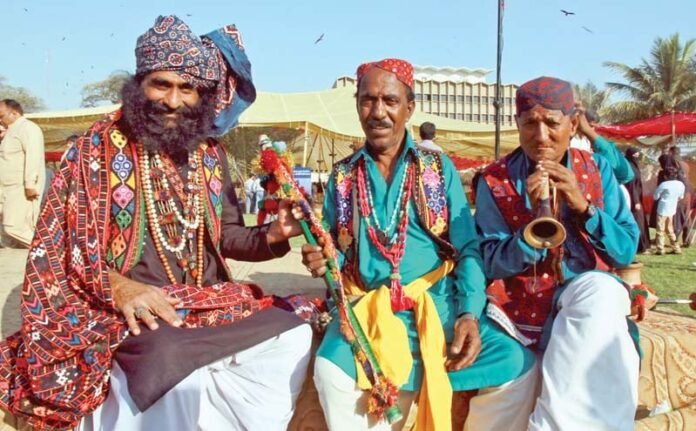In the dusty village lanes of Umerkot, Sindh, an 18-year-old folk singer named Sham Bhai quiets the crowd as she begins her haunting melody. Her voice, raw and sincere, weaves through stories of broken homes, flooding rains, and women left behind to struggle when disaster strikes. Singing in Sindhi, the local language spoken in many rural parts of the province, Sham’s songs are not just performances—they are climate education set to music.
Her lyrics speak of collapsed houses, unpredictable winds, and the vulnerable lives of women and children in villages battered by extreme weather. “My heart is burned from seeing the collapsed houses in the rain. Oh, beloved, come home soon,” she sings, referencing the displacement that follows every flood. It’s a scene all too familiar in Sindh, where over 1,000 people died during the monsoon disasters of 2022, and many more lost their homes, land, and livelihoods.
Sham, a survivor of the floods herself from Tando Allahyar, has since traveled to a dozen remote communities, using traditional song to teach villagers—especially those who cannot read or access the internet—about climate adaptation, resilience, and preparedness. With Sindh’s rural literacy rate as low as 38%, song remains one of the most powerful and accessible tools of communication.
“When we give a message through song, it is easy to communicate because they understand it,” Sham says. She and her small group of performers start with upbeat tunes to draw people in, then transition into more emotional and informative pieces about changing weather patterns, the need to plant trees, and how to build stronger homes to withstand future storms.
The region where she performs still bears the scars of past floods. Roads remain broken, houses stand half-repaired or abandoned, and farmers have had to abandon summer crops in favor of winter farming and livestock. “The monsoon used to come on time,” said farmer Ghulam Mustafa Mahar. “Now it’s unpredictable. We’ve had to change everything.”
As Sham’s voice reaches village after village, another voice is rising from Sindh’s underground music scene—Urooj Fatima, better known as Sindhi Chhokri. A fiery climate justice rapper and activist from Jhuddo, she is shaking the conservative rural landscape with sharp lyrics and blunt truth.
Urooj turned to rap after watching her own village drown in floods in 2022 and again in 2024. “People in rural areas have no idea what climate change is,” she says. “We can reach thousands through our lyrics.” Her powerful verses criticize government negligence, inequality, and the indifference shown to provinces like Balochistan and Sindh. One of her raps—written in response to the 2022 floods—went viral on social media:
“There are potholes on the road; the roads are ruined. I am telling the truth. Will your anger rain down on me? Where was the Balochistan government when the floods came? My pen thirsts for justice. Now they’ve succeeded, these thieving rulers. This isn’t a rap song, this is a revolution.”
For Urooj, climate change is not just about the environment—it’s about justice. Alongside her sister Khanzadi, she campaigns in person and online, planting trees, organizing awareness drives, and demanding government action. “This happens every year,” she says. “Climate change affects a person’s whole life. Their whole life becomes a disaster.”
Urooj is especially vocal about how women and girls suffer most. Displacement, lack of education, hygiene issues, and food insecurity are magnified by gender inequality, and there is little infrastructure or policy to support women during climate emergencies. “For women, there are no opportunities or facilities. And then, if a flood comes from above, they face more difficulties,” she explains.
Though her activism has drawn criticism, especially in conservative rural areas, Urooj remains defiant. “Rap is a powerful platform. Even if it reaches just a few people, that’s a victory. We will not let our voices be silenced.”
In a country where climate change often feels like an abstract issue or a political slogan, young artists like Sham and Urooj are making it real—using tradition, music, and lived experience to warn, educate, and empower. Whether through the mournful notes of a Sindhi folk song or the fiery lines of a protest rap, their message is clear: climate change is here—and the people are ready to fight back.






















